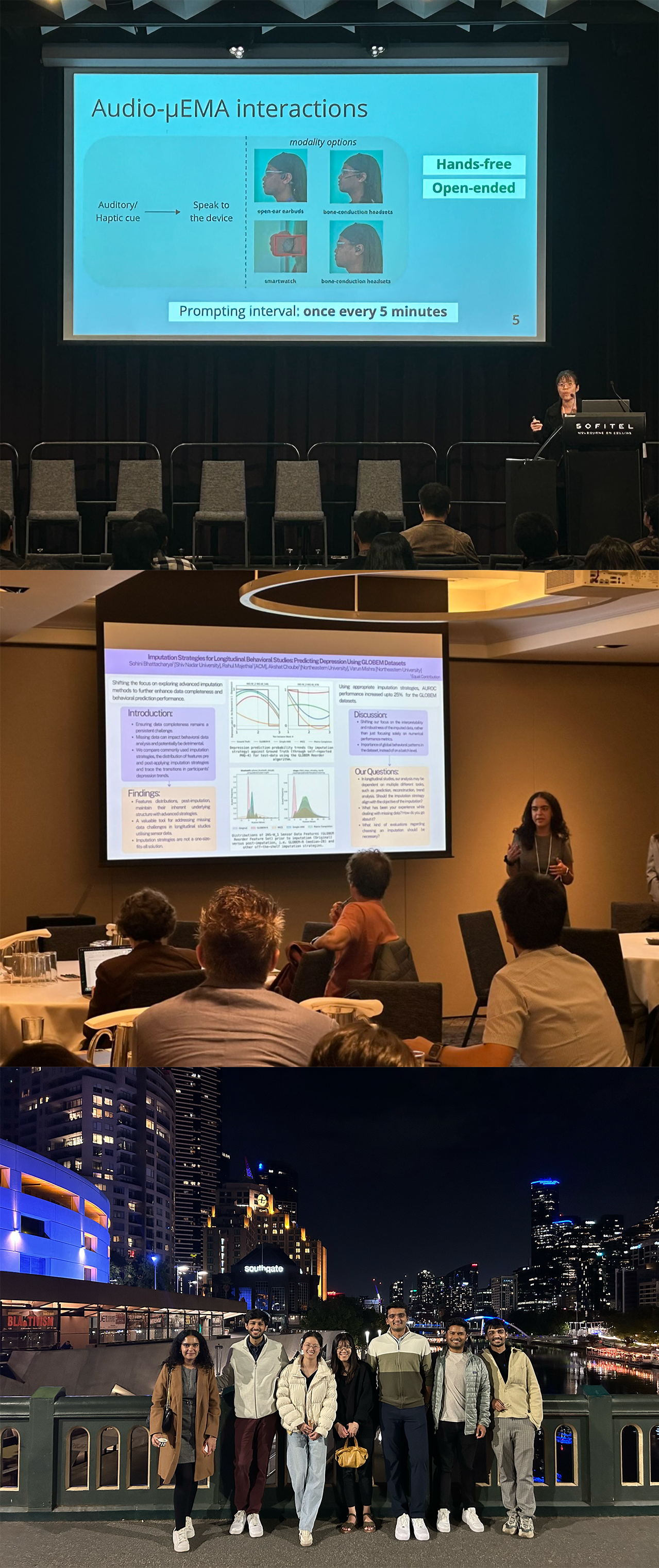UbiWell Lab at UbiComp 2024
Published on
Several lab members attended UbiComp 2024 in Melbourne!
Overview
- 2 papers
- 1 workshop
- PACM IMWUT editorial board meeting
- Members who attended: Varun, Vedant, Akshat, Ha, and Sohini.
Papers
Le et al., UbiComp 2024 (IMWUT)
Ha presented her IMWUT paper on the audio-EMA system which enabled her to prompt users to complete Ecological Momentary Assessments every 5 minutes with almost 70% compliance.
μEMA is a data collection method that prompts research participants with quick, answer-at-a-glance, single-multiple-choice self-report behavioral questions, thus enabling high-temporal-density self-report of up to four times per hour when implemented on a smartwatch. However, due to the small watch screen, μEMA is better used to select among 2 to 5 multiple-choice answers versus allowing the collection of open-ended responses. We introduce an alternative and novel form of micro-interaction self-report using speech input - audio-μEMA- where a short beep or vibration cues participants to verbally report their behavioral states, allowing for open-ended, temporally dense self-reports. We conducted a one-hour usability study followed by a within-subject, 6-day to 21-day free-living feasibility study in which participants self-reported their physical activities and postures once every 2 to 5 minutes. We qualitatively explored the usability of the system and identified factors impacting the response rates of this data collection method. Despite being interrupted 12 to 20 times per hour, participants in the free-living study were highly engaged with the system, with an average response rate of 67.7% for audio-μEMA for up to 14 days. We discuss the factors that impacted feasibility; some implementation, methodological, and participant challenges we observed; and important considerations relevan
Bhattacharya et al., UbiComp 2024 (MHSI Workshop)
Sohini and Akshat presented their workshop paper on evaluating imputation strategies for longitudinal passive sensing studies, where they demonstrated a 25% increase in predictive performance!
Given the prevalence of missing data in longitudinal passive sensing studies, data imputation -- a critical preprocessing step -- is often overlooked by researchers in favor of other aspects of data analyses, like building sophisticated models or outcome prediction. In this paper, we seek to direct the attention of the behavioral and mental health-sensing community toward the importance of data imputation in such studies. In this work, we evaluate and benchmark off-the-shelf imputation strategies using the open-source GLOBEM platform and datasets. Our results demonstrate that using appropriate imputation strategies could improve performance by up to 25% increase in AUROC for predicting participants? future depression labels (self-reported PHQ-4) using past sensing data with the same model building and prediction pipeline as the GLOBEM platform, without compromising the inherent underlying structure of behavioral sensing data post-imputation. Furthermore, we observe that certain imputation strategies significantly improve the separability of predicted depression probabilities on the test data, compared to no or trivial imputation. Lastly, we present a case study of users with changing depression labels and demonstrate that by using these imputation strategies, we are better able to capture and trace within-person transitions of depression as compared to trivial or no imputation.
Workshop
Varun co-organized the 9th Mental Health Sensing and Intervention Workshop. This year the workshop featured two amazing keynotes, 9 papers presentations, and roundtable discussions. The Center for Technology and Behavioral Health (CTBH) sponsored the best paper award!
